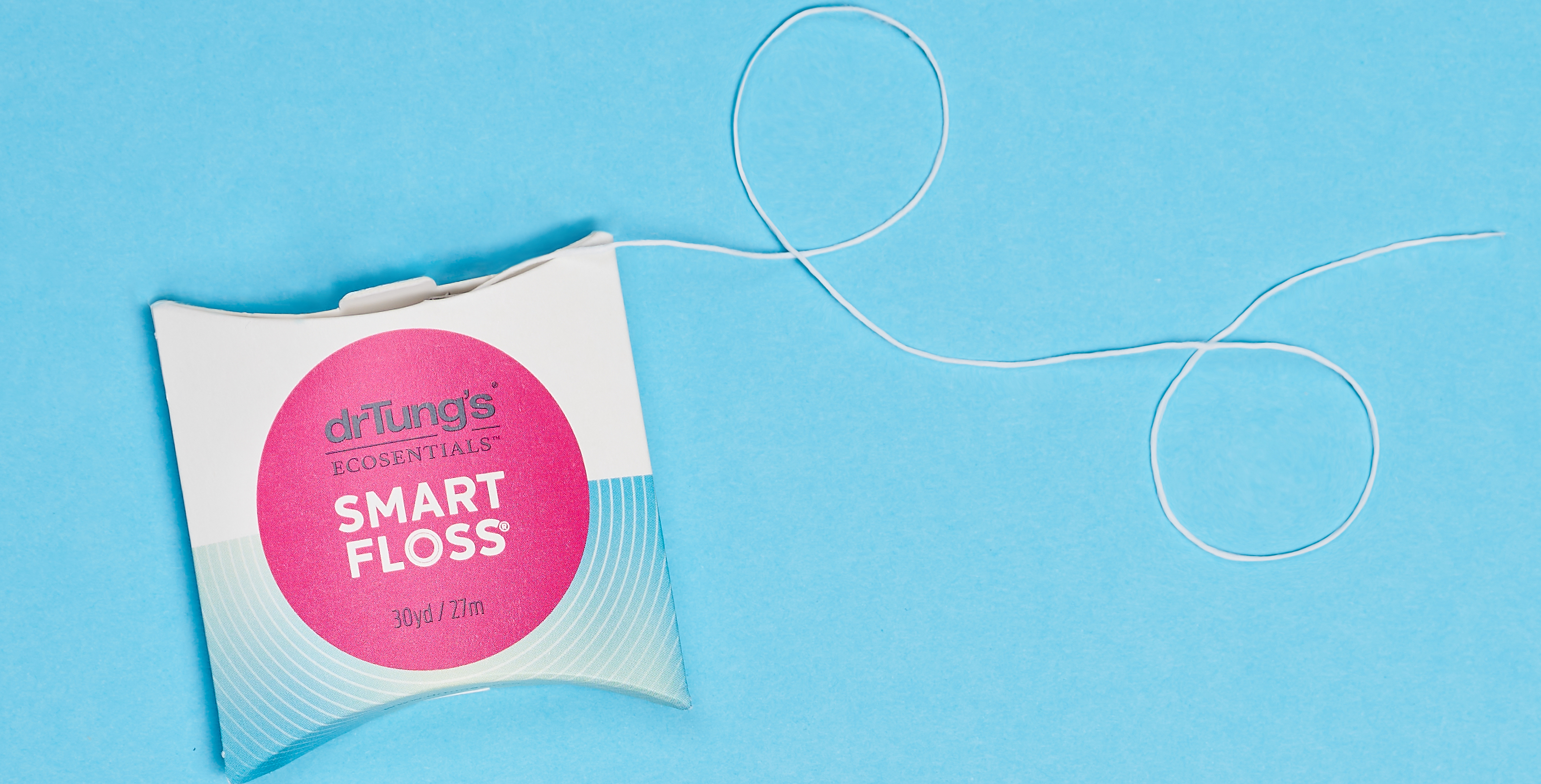So, you’re on top of your flossing and brushing game, brushing twice a day and flossing before going to bed. But lo and behold, you’re still catching whiffs of your own breath (or worse yet, other people are telling you your breath stinks). So why do you still have breath breath even after flossing and brushing?
Bad breath can be a complicated thing — there are lots of possible causes and it may be frustrating and embarrassing to constantly try different products and methods without seeing results.
But before you grab that bottle of generic mouthwash, follow our handy guide to troubleshooting your bad breath.
5 common causes for bad breath
#1—Your flossing routine needs work
Having a poor flossing routine is a huge cause of bad breath. Flossing is equally as important as brushing, and plaque remaining between the teeth is enough to cause bad breath.
It could be down to your dental floss, or your flossing routine.
Dental floss
Most regular dental floss options on the market are woefully inadequate. These companies put more time into making the floss glide than actually making it effective at removing plaque and bacteria.
Just because your floss glides easily between the teeth doesn’t mean it’s good at removing plaque! Once the floss is between the teeth, it doesn’t effectively remove plaque.
An effective floss has a thickness and a texture that “grabs” the plaque between the teeth.
For ultimate plaque removal, use our Smart Floss. It removes 55% more plaque than regular dental floss! It works by expanding when moistened, allowing it to cover more surface area. This means more coverage and plaque removal.
Flossing routine
If you’re already using Smart Floss but you’re still experiencing stinky breath, you might want to assess your flossing routine.
Be patient when you’re flossing, and allow yourself extra time to floss properly. Avoid “snapping” the floss between your teeth. Snapping is when you force the floss straight down between your teeth. Not only does it damage your gums overtime, but it doesn’t effectively clean your teeth.
Instead, try easing the floss between your teeth, and wrap the floss around the tooth in a ‘C’ shape while sliding the floss up and down a few times. Use a fresh section of floss for each tooth so as not to contaminate the next area with plaque and bacteria pulled from previous tooth.
More plaque lingers between your teeth than you realize, so don’t underestimate your flossing routine!
#2—Your brushing routine is rushed
Most people don’t actually know the correct way to brush their teeth! Removing plaque and preventing tooth decay requires attention and patience–but not as much as you think.
If you’re not spending at least 2 minutes brushing your teeth, you’re probably doing it wrong.
Here are some key pointers:
⇒ Spend 30 seconds per quadrant.
⇒ Cover all surfaces of the tooth: the chewing side, the outside, and the inside.
⇒ Start at the gumline, with your toothbrush at a 45 degree angle, and brush away from your gums (this prevents gum recession and helps you remove the plaque near the gumline)
#3—You have lingering bacteria on your tongue
Bacteria on the tongue is one of the biggest culprits of unexplained bad breath. If you don’t deal with it regularly, you’ll likely have bad breath.
The best way to remove this accumulated bacteria and food debris is to clean your tongue with a tongue scraper. If you want to take tongue cleaning to the next level, invest in a tongue scraper. We offer copper and stainless steel tongue cleaners that are incredibly effective, easy to use, and hygienic.
Tips to effectively clean your tongue:
⇒ Morning Routine: Perform tongue cleaning as the first step of your morning routine, before flossing and brushing your teeth.
⇒ Proper Technique: Extend the tongue slightly and gently scrape from the back of the tongue to the front. Rinse the scraper after each pass to remove gunk.
⇒ Gradual Pressure: Apply light pressure to avoid discomfort or damaging the tongue's surface. Focus on the central and back areas where buildup is common.
#4—You’re using harsh oral care products
Many regular oral care products dry out your mouth, and dry mouth is another common cause of bad breath. These products, especially mouthwashes, typically contain additives like SLS, alcohol, and artificial dyes and flavors. All of which have an irritating, drying effect.
Healthy saliva production helps to wash away bacteria and food particles that cause bad breath. But when you’re not making enough saliva, your mouth can’t cleanse itself and that means more bacteria and particles left behind in your mouth — and more bad breath! It becomes that vicious cycle.
Optimize your natural saliva balance with DrTung's Herbal Toothpowder Tabs. These tabs consist of a blend of ingredients aimed at nurturing your oral microbiome, promoting the well-being of your teeth, gums, breath, and saliva. Crafted from pure and wholesome organic components with no harsh chemicals or artificial ingredients, they contribute to a healthy oral environment — ensuring a happier mouth and fresher breath.
#5—Your sinuses are out of whack
Most people don’t realize that sinusitis and sinus infections can cause wickedly bad breath. Everybody has phlegm, and it’s normally odorless. But phlegm becomes stinky when it starts to dry up and get thicker.
Whether you have allergies, sinusitis, or post-nasal drip, seek relief from your sinus issues. For all-natural relief, try irrigating your sinuses with a neti pot. Neti pots are affordable and easy to find at most drugstores.
#6—(BONUS) You have an undiagnosed medical condition.
If you’ve ruled everything out and you’re following an excellent oral care routine, you might have an undiagnosed medical condition.
The most common medical condition causing stinky breath is diabetes. People with new diabetes cases experience ‘fruity’ or even ‘nail polish remover’ breath. If you’re experiencing this, seek medical attention.
Other medical conditions causing stinky breath include kidney and liver disease.
If you’re at all worried, book an appointment with your doctor.
MEDICAL DISCLAIMER: the information in this article is educational in nature, and is not medical advice. Always consult a healthcare professional regarding medical conditions.
The Takeaway
If your breath still stinks even after flossing and brushing, you’re not alone. Lots of people continue to struggle with bad breath and don’t understand why.
But the good news is that some simple, natural routines can greatly improve your breath, without the need for harsh drying chemicals. You might actually be making your breath worse by constantly gargling mouthwash!
We invite you to get really curious about uncovering the root of the problem. No bandage solutions around here!
We hope this article left you with the confidence to know that bad breath is solvable.
Looking for a simple and effective way to instantly improve your breath? Shop our tongue cleaners in copper and stainless steel now!







